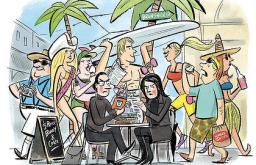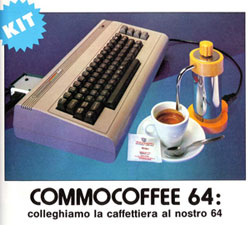The Null Device
Posts matching tags 'coffee'
2012/2/25
The (Melbourne) Age has a piece looking at the history of the long-running rivalry between Melbourne and Sydney (which is sort of like Australia's equivalent of the rivalry between Edinburgh and Glasgow), and the layers of values attached to those two points on the map by generations of their advocates and detractors:

Some contend that it is based on the foundation stories of the capitals. Sydney was set up as an open-air jail in 1788, whereas Melbourne was founded in 1835 by independent settlers seeking new farmland.
By the 1880s, writer Marcus Clarke sought to share the spoils by pointing out that Sydney would probably evolve as “the fashionable and luxurious capital”, while Melbourne would become the intellectual and cultural capital.The article discusses the usual stereotypes (Sydney: glamorous if ditzy, with breathtaking harbour views; Melbourne: Europeanised, full of pretentious people who read a lot and watch art-house films), debunks a few others (Sydney apparently gets twice as much rain as Melbourne, though, of course, being Sydneysiders, they take theirs in spectacular thunderstorms) and states that the coffee is better in Melbourne. That may well be so (it's hard to go past Atomica or Jasper), though the last time I was in Sydney, they had excellent coffee there as well. (If I recall correctly, Campos in Newtown is pretty good.)
2010/4/14
The latest frontier of Antipodean coffee culture: New York, where Melbourne-style cafés, and even a barista college, are opening:
''The New York coffee scene is similar to Melbourne in 1985. When I moved here about six years ago, there was virtually nowhere that served quality espresso coffee. I originally planned to pick up an idea here and then move back to Melbourne to cash in. But I realised there was a huge opportunity here because nothing in New York compared to our cafes,'' Mr Hall says.Though wasn't Melbourne's coffee scene at a fairly decent technical level, if not yet acclaimed around the world, in 1985? After all, Australia had mass Italian immigration in the 1950s, resulting in the establishment of Italian-style cafés catering to patrons who expected quality. (This is not to be confused with places where handfuls of immigrants trickled in and opened cafeterias or diners, making whatever the locals were already used to; this is the case in the UK, where there are plenty of cafeterias run by Italian immigrants, most of them serving the greasy fry-ups and mugs of builder's tea the locals feel comfortable with. It seems to me that a country only assimilates a culinary tradition if it takes in enough migrants from that tradition to not only act as producers but also as discerning consumers.)
2010/3/2
Apparently, London is experiencing somewhat of a coffee renaissance, with a number of good cafés having opened over the past two years or so, many of them run by Australians or New Zealanders. Time Out has a helpful map of notable cafés in London here.
Having said this, London's still the sort of city where one has to go out of one's way to look for drinkable espresso; whereas in Melbourne or Sydney (or, by all accounts, in New Zealand), the baseline of what a café can offer without going out of business is fairly high, here one takes one chances. (I still remember the cup of bitter, watery bilge and overboiled milk that passed for a cappucino according to the haircut behind the bar in Hoxton who made it.)
Anyway, it appears that, like most interesting activity in London, most of the action is happening around the East End, with places like Climpson, Prufrock, Taste Of Bitter Love and Tina, We Salute You (which, it seems, is within walking distance of my previous residence) getting mentioned.
2009/8/24
The awards for the funniest jokes of the Edinburgh Fringe have been announced:
1) Dan Antopolski - "Hedgehogs - why can't they just share the hedge?"
4) Zoe Lyons - "I went on a girls' night out recently. The invitation said 'dress to kill'. I went as Rose West."
6) Adam Hills - "Going to Starbucks for coffee is like going to prison for sex. You know you're going to get it, but it's going to be rough."
2008/8/1
In the wake of Starbucks' Napoleonically epic retreat from Australia, The (Melbourne) Age has a piece on Melbourne's indomitable coffee culture, which apparently goes back long before mass Italian immigration in the 1950s and the resulting espresso boom:
In his entries on coffee and coffee palaces in the Encyclopedia of Melbourne, [historian Andrew Brown-May] retells the beginnings of Melbourne's coffee culture, traced back to the street stalls of the 1850s that offered caffeine hits to rushed city workers, then re-emerging as continental coffee houses in the interwar years of the 1920s and 1930s.
By the 1950s, the influx of Italian migrants had helped redefine coffee for Melbourne once again, serving it up in espresso cups instead of percolators. Yet two of the key proponents of the espresso bar were father and son team Harry and Peter Bancroft, Anglo-Australians who in 1953 secured the rights to manufacture Gaggia coffee machines and set up a cafe in St Kilda.I didn't know that they actually made Gaggia machines in Australia. You learn something new every day.
The article then points out that narratives framing the vanquishment of Starbucks in simple plucky-Aussies-vs.-Yankee-imperialists terms aren't entirely accurate; rather, it's a case of Starbucks sowing the seeds of their own defeat by not acknowledging that the café-culture experience they were trading on is essentially one of differentiation from the mainstream, and that a Starbucks in every suburban shopping mall destroyed a lot of the cachet behind the brand; it's the "nobody goes there anymore; it's too crowded" phenomenon that poisons cultural trends (from musical genres to fashions—think the trucker hat, the "Hoxton fin" haircut, or anything labelled "indie" in the UK) as soon as they become successful.
Writing in The Christian Science Monitor, Temple University historian Bryant Smith argues that when Starbucks began, it offered Americans an entree into a status-filled world with is own language of ventis, grandes, Tazo teas and special-blend coffees, all stamped with the company's distinctive green logo.
But by becoming too common — Starbucks first opened in Australia in 2000 and expanded to 84 stores in eight years — the company "violated the economic principles of cultural scarcity", Smith says.One cause, of course, doesn't exclude the others. Starbucks never became the all-conquering juggernaut in Australia it became elsewhere, due to the sophisticated local coffee culture, and while its recent misfortune has been global, it would have hit particularly hard in a relatively inhospitable market such as Australia.
2008/7/29
Multinational coffee chain Starbucks have announced that they will close 61 our of their 85 Australian outlets. That's just under 72%.
What surprises me is that they had 85 outlets in Australia in the first place. Thanks to large-scale Italian immigration in the 1950s and 1960s, Australia has very high standards for what constitutes a good cup of coffee. The inner cities of Australia are full of cafés with espresso machines and baristas who know how to use them well, to the point where cafés in the UK advertise their staff's Australian training, and the locals' expectations of coffee is at a level well above Starbucks' ability to compete, even with their resources.
Who could possibly have patronised all those Starbucks outlets? Surely there wouldn't have been enough risk-averse American businessmen passing through to justify 85 of them.
2008/7/8
Corporate coffee chain Starbucks isn't doing too well; they've had to close 600 stores in the US, in less than favourable circumstances. (Favourable circumstances for Starbucks being closing the 2nd and 3rd stores they opened on a block and ran at a loss after the last independent café nearby went out of business.) Unsurprisingly, some coffee fans are over the moon:
New York Web designer Zachary Thacher, who favors Greenwich Village's cafes, said he avoids Starbucks. "They've commoditized cafe culture, which is why I don't go," he said.
The company that began as innovative is now known for consistency and convenience, [another commentator] said. "To me, that's a huge step down," she said. "You've built your franchise on people who are coming in because they know exactly what they want."Starbucks still has their defenders, mostly on the grounds that they're convenient and consistent.
2008/2/1
BBC News Magazine has an article on the evolution of café culture in Britain.
But a good coffee can be a catalyst, says the three times UK National Barista Champion, Simon Robertson. "However busy you are, in the time it takes you to finish that coffee your normal world is put on hold and you go somewhere else in your head. It's about creating a moment, creating an experience."
We are in the "Blue Nun stage" of coffee drinking, says Mr Robertson. Just like wine a generation ago, people have started drinking coffee but don't know enough about it to judge if it's good or not.While Britain hasn't had as pervasive a café culture as, say, Australia (probably due to the influx of migrants from Italy and Greece to the latter in the 1950s) or parts of the US, it is gradually catching up. Unfortunately, big corporate coffee chains have had the time to establish themselves in the minds of the public as the definition of what the café experience is (i.e., as a sort of McDonald's for people who read newspapers), and have gotten away with making execrable coffee and passing it off as something decent (case in point: Costa Coffee's "authentic Italian" coffee, which is vile). The notorious predatory behaviour by which chains have eliminated independent cafés elsewhere (opening three outlets to a block, running them at a loss until the rivals go out of business, close all but one) wasn't even necessary, because the bar for coffee, in most places, was set so low that Starbucks was actually an improvement.
Fortunately, there are signs that this is changing, and consumers are becoming more savvy and discriminating:
"I treat myself to one "special" coffee per week and was always disappointed with the big brand coffee shop that I used as they frequently messed up my order and lacked that personal touch. One week I decided to use the smaller place across the road and to my delight discovered that not only do they get my drink right 100% of the time but actually smile and chat to me while I'm there. Their prices are also substantially cheaper that the big names. Go back to the big brand coffee house? Not me."
Mr Robertson insists the coffee making experience is paramount. He recalls when an elderly customer stopped him to say the coffee he'd just drank was the best he'd had since his time in Italy.
"I asked him when he was last in Italy and he said during World War II. I realised the coffee I'd just made him - the smell, the taste, the experience - had transported him all the way back in his mind to wartime Italy.The big chains have an advantage—deep pockets, allowing them to lease prime space—whereas the smaller cafés are often hidden away. Though web-based independent café directories like Delocator and Cosy Coffee Shops are helping to level the playing field.
Interestingly enough, Australia seems to have become a standard for coffee quality. I've seen two places so far which advertised that they employed "Australian-trained baristas".
2006/12/7
Last.fm is currently temporarily down, and displaying a grey page with text, in various languages, informing the user of this fact.
Interestingly enough, the English message reads:
We're sorry, but our database servers are currently overloaded. Please enjoy a quick cup of tea and then try refreshing this page.whereas the Italian one reads:
Siamo spiacenti ma i nostri server sono momentaneamente sovraccaricati. Gustatevi un caffè veloce e provate ad aggiornare questa pagina.Which, literally, invites the user to have a cup of coffee (which, when one thinks about it, is more culturally appropriate than literally translating it to a cup of tea).
The Portuguese translation seems to also mention coffee, though the French, German and Polish ones seem to stick with tea; the Spanish one doesn't seem to mention any beverage. I don't know what the Russian, Japanese or others say.
Which gives a concise tea-vs.-coffee map of European cultures. And it made me wonder whether, were it written in Australian English, it would refer to coffee rather than tea. And what about American English? Perhaps "please enjoy a Mega-Grande Lattucino™" or something?
2006/7/6
You can do a lot of things with a Commodore 64. Some people make music with them. Meanwhile, in the mid-1980s, the Italians adapted this versatile workhorse of a computer to the task of making a cup of coffee:
From what I gather, the Commocoffee 64 was basically a coffee maker without a built-in timer, which could be plugged into the cartridge port of a C64, using the machine to do the timing. Which, of course, is not the most efficient use of a then expensive computer which could only do one thing at once, though that was probably not the point.
(via Boing Boing) ¶ 3
2004/12/18
 A British designer has created a coffee mug with a shelf for storing biscuits. The Dunk Mug, sensibly enough, comes in left- and right-handed variants. (via bOING bOING)
A British designer has created a coffee mug with a shelf for storing biscuits. The Dunk Mug, sensibly enough, comes in left- and right-handed variants. (via bOING bOING)
2003/9/2
Vigorous competition in the global coffee-bean market has forced growers to find more ways of slashing costs and meeting ever-tighter margins. Some coffee growers in Brazil have found a way of running more efficiently: using slave labour. This typically involved "hiring" poor labourers in one part of the country, shipping them to another part and then neglecting to pay them; not having any money to get home, the labourers would have no choice but to work. Too bad for the growers that the meddling government decided to squash this sterling example of free-market ingenuity.
(Apparently coffee prices these days are unnaturally low, so non-slave-labour using plantations cannot compete on the market and end up going out of business. Not to worry; once all the plantations that are unfit to compete in this market go under and are bought out by an oligopoly of a few gigantic De Beers-like coffee multinationals, prices will go up to more sustainable levels and beyond. The wisdom of the free market corrects all mistakes.)
2001/12/28
Soon, batteries may be made of used coffee grounds; researchers at Sony have discovered a way of using the waste grounds as raw materials for battery manufacturing. This will help to reuse waste, and also cut the manufacturing cost of batteries by up to 10%.